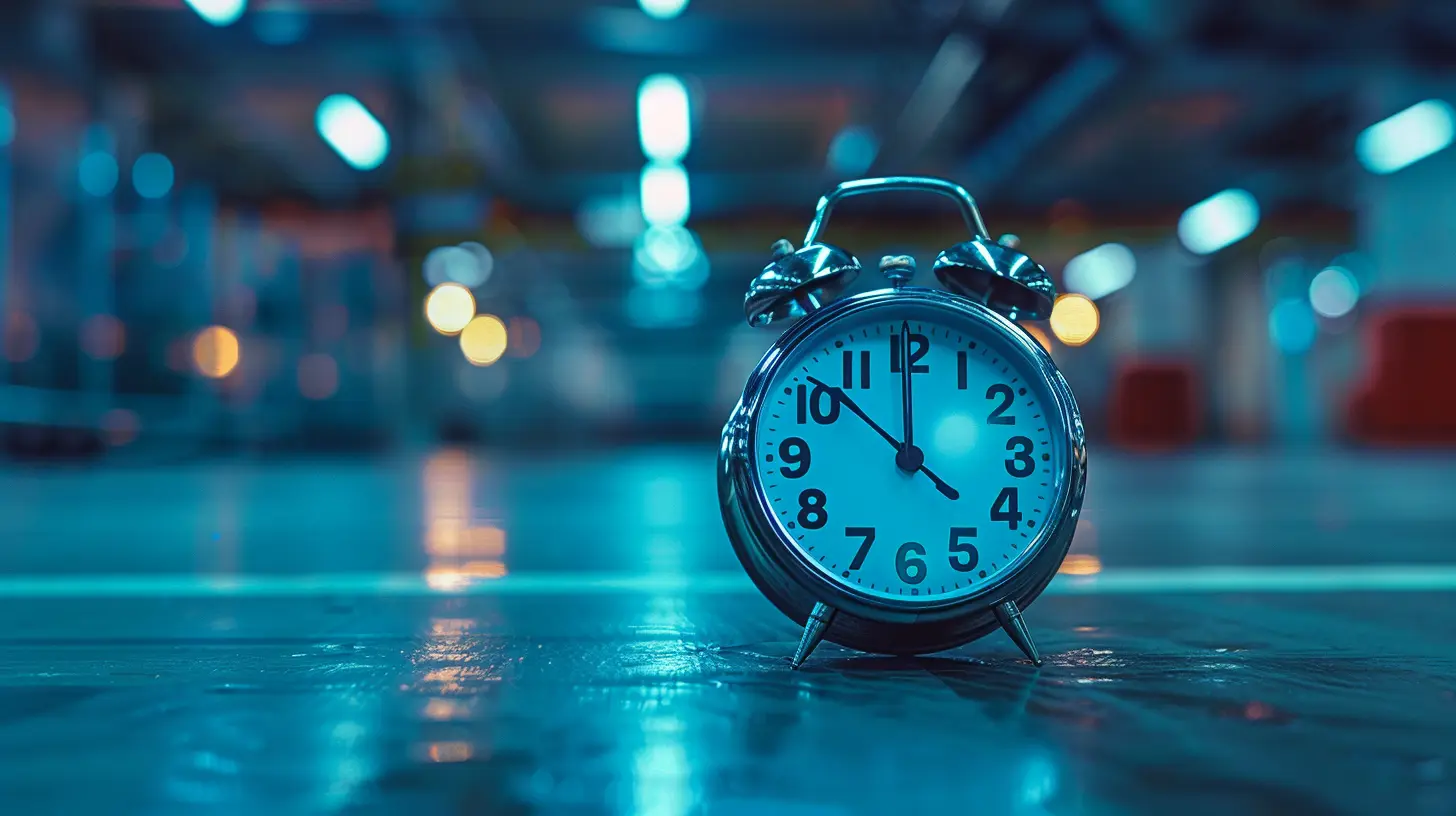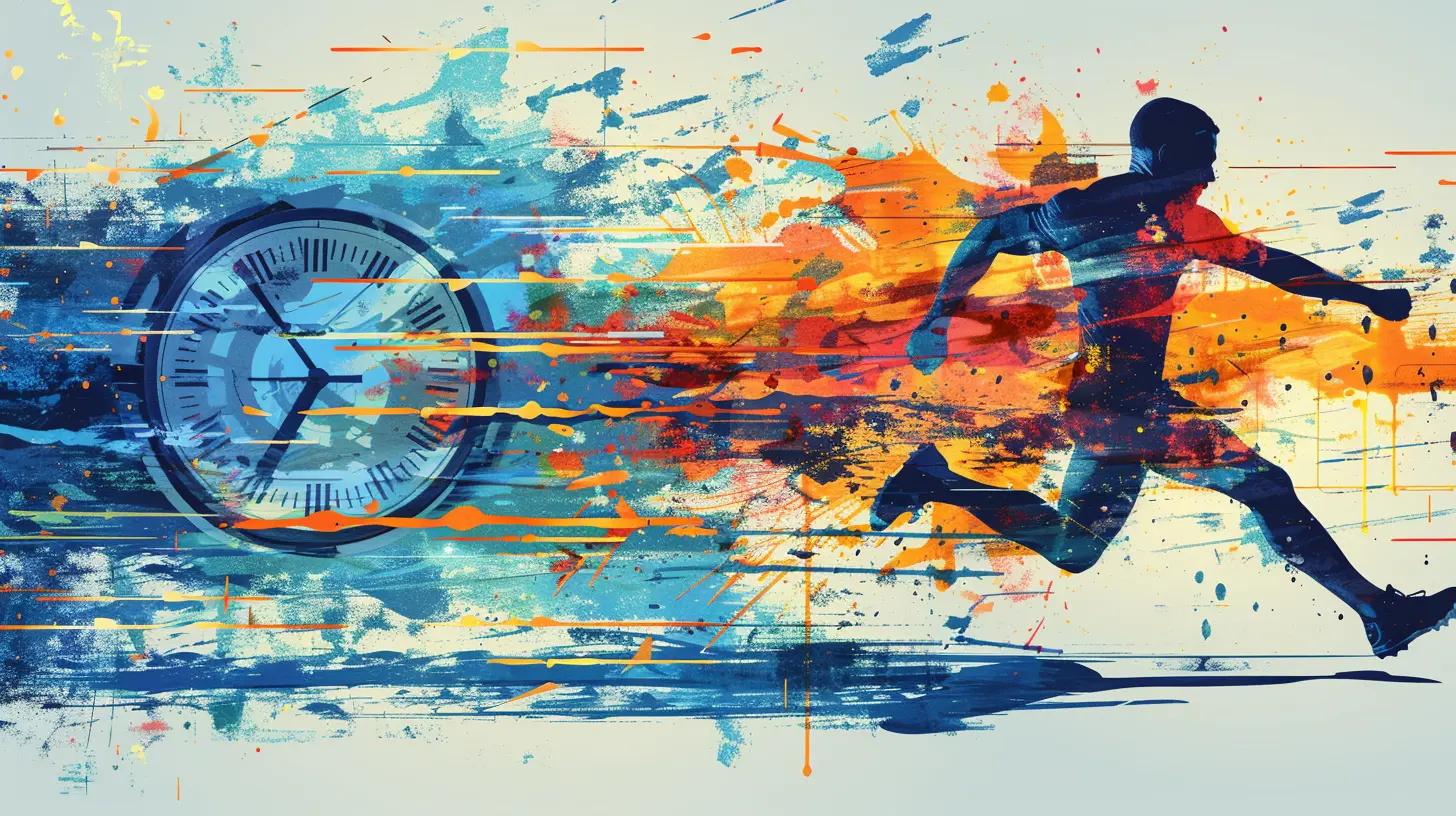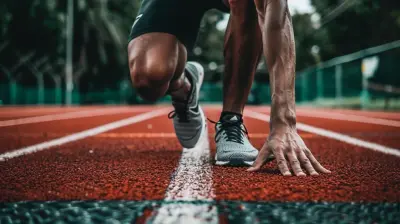How Circadian Rhythms Affect Athletic Performance: A Scientific Exploration
11 February 2025
Have you ever wondered why some athletes seem to perform better in the morning, while others are night owls who hit their stride in the evening? The answer may lie in something you probably take for granted — your circadian rhythm. This natural internal clock influences nearly every aspect of your life, from when you feel tired to how well you perform athletically. But how does it work, and more importantly, how does it impact athletic performance?
In this article, we'll dive deep into the science of circadian rhythms, how they affect athletic performance, and what athletes can do to optimize their training and competition times. So, let’s get into it!

What Are Circadian Rhythms?
First things first: What exactly are circadian rhythms?Your circadian rhythm is a 24-hour internal clock that cycles between periods of wakefulness and sleepiness, largely influenced by light and darkness in your environment. It’s like your body’s personal timekeeper, helping regulate various physiological processes, including hormone release, body temperature, and metabolism. It’s the reason you feel sleepy at night and (hopefully) awake in the morning.
The term "circadian" comes from the Latin words "circa" (which means "around") and "diem" (which means "day"). In simple terms, it’s your body’s way of keeping track of time over the course of 24 hours.
The Role of the Suprachiasmatic Nucleus (SCN)
The master clock behind this rhythm is located in the brain’s hypothalamus, in a region called the suprachiasmatic nucleus (SCN). This tiny cluster of neurons acts as your body's command center, syncing everything to the external environment — primarily through light exposure.When light enters your eyes, it sends signals to the SCN, telling your brain whether it's day or night. This, in turn, instructs all sorts of processes in your body, from when to produce melatonin (the sleep hormone) to when to increase cortisol (a hormone that helps you wake up and be alert).
But what does this have to do with sports?

Circadian Rhythms and Athletic Performance
Believe it or not, your circadian rhythm doesn’t just dictate when you feel like crawling into bed; it also plays a huge role in how well you perform physically. The time of day can influence your muscle strength, reaction time, flexibility, and even how much oxygen your body can use.Morning vs. Evening: When Are You at Your Best?
Most studies suggest that athletes tend to perform better in the late afternoon or early evening. Why? Because that's when your body temperature is at its highest, which is essential for muscle function and flexibility. A higher body temperature improves muscle tone, coordination, and reaction time — all crucial for athletic performance.In contrast, your body temperature is lower in the morning, which can make your muscles feel stiffer and less flexible. This is why morning workouts might feel like a drag compared to evening sessions.
However, not everyone is the same. Some athletes are "morning people" and may perform better earlier in the day due to their individual circadian rhythms. This is where understanding your personal chronotype comes in handy.
Chronotypes: Larks vs. Owls
People generally fall into one of two categories: larks (morning people) or owls (night people). Your chronotype refers to your natural inclination regarding the times of day you prefer to sleep or be active.- Larks: These are your classic early risers. They feel most energetic and alert in the morning and may struggle to stay awake late into the night. Morning workouts might suit them better due to their natural circadian rhythm.
- Owls: Night owls prefer staying up late and often feel more awake and alert in the evening. They usually have a harder time waking up early and may find evening workouts more effective.
Understanding where you fall on this scale can help you tailor your training schedule to optimize performance. For example, if you're a lark, trying to perform at your peak at 9 PM might not be ideal.
The Science Behind Timing and Performance
Several scientific studies back up the relationship between circadian rhythms and athletic performance. Research shows that the highest levels of strength, power, and endurance typically occur in the late afternoon or early evening — around 4 PM to 8 PM. This is largely due to the following factors:- Body Temperature: As mentioned earlier, your body temperature is higher in the afternoon, which enhances muscular function, flexibility, and energy metabolism.
- Hormonal Cycles: Hormones that influence performance, such as testosterone and cortisol, also fluctuate throughout the day. Testosterone, which is important for muscle growth and recovery, tends to peak in the morning and again in the late afternoon. In contrast, cortisol levels (which can increase stress) are highest in the morning and decline as the day progresses.
- Reaction Time: Reaction time has been found to be faster in the late afternoon and evening, which is crucial for sports that require quick responses, such as basketball, tennis, and soccer.
Sleep and Recovery
Circadian rhythms also play a pivotal role in sleep, which is arguably one of the most crucial aspects of athletic recovery. We all know that sleep is essential for muscle repair, hormone regulation, and mental focus — but poor sleep can throw your circadian rhythm out of whack, leading to suboptimal performance.Athletes who don’t get enough sleep or whose sleep schedules are irregular (think jet lag or constantly shifting training times) can experience disruptions in their circadian rhythm, leading to fatigue, slower recovery times, and even a higher risk of injury.

Practical Tips for Athletes: Optimizing Performance Based on Circadian Rhythms
So, how can you use this information to your advantage? Here are a few practical tips for athletes looking to optimize their performance based on their circadian rhythms.1. Schedule Workouts According to Your Chronotype
If you're a morning person, schedule your most intense or important workouts earlier in the day. If you're a night owl, aim to train in the late afternoon or evening. Understanding your natural tendencies will help you perform better and reduce the risk of injury.2. Train Consistently at the Same Time
Your body thrives on consistency, so try to train at the same time every day. This helps your body adapt to the routine, making it easier to perform at your best during that time of day.3. Get Enough Sleep
Sleep is crucial for maintaining a healthy circadian rhythm. Aim for 7 to 9 hours of sleep per night, and try to go to bed and wake up at the same time each day. This will help your body recover properly and keep your internal clock in sync.4. Consider Light Exposure
Light is one of the most powerful regulators of circadian rhythms. If you're training earlier in the day, make sure to get plenty of natural light in the morning to boost alertness. If you're working out in the evening, try to limit light exposure before bedtime to avoid disrupting your sleep cycle.5. Adjust for Competition Times
If you're preparing for a competition that takes place at a time you're not used to, try to gradually adjust your schedule in the weeks leading up to the event. This will help your body adapt and perform better when it counts.
Circadian Rhythms, Jet Lag, and Travel
One of the biggest challenges athletes face is adjusting to different time zones when traveling for competitions. Jet lag occurs when your internal clock is misaligned with the local time, leading to fatigue, insomnia, and poor performance.To minimize the effects of jet lag, athletes can:
- Gradually adjust their sleep schedule a few days before traveling to match the destination’s time zone.
- Expose themselves to natural light at the right times to help shift their circadian rhythm more quickly.
- Stay hydrated and avoid caffeine close to bedtime to improve sleep quality.
Conclusion: Timing Is Everything
Your circadian rhythm is much more than just a sleep-wake regulator. It’s a key player in athletic performance, influencing everything from muscle strength to reaction time. By understanding your own rhythm — whether you’re a lark or an owl — and timing your workouts accordingly, you can unlock a whole new level of performance.So, next time you’re hitting the gym or competing in a big race, remember: It’s not just about how hard you train — it’s about when you train.
all images in this post were generated using AI tools
Category:
Sports ScienceAuthor:

Frankie Bailey
Discussion
rate this article
17 comments
Rosanna McCollum
Great article! Understanding how circadian rhythms influence athletic performance is crucial for optimizing training and recovery. This exploration sheds light on a fascinating aspect of sports science that can help athletes reach their peak potential. Keep up the excellent work!
March 30, 2025 at 3:43 AM

Frankie Bailey
Thank you for the kind words! I'm glad you found the exploration of circadian rhythms helpful in optimizing athletic performance. Your support means a lot!
Marissa McInerney
Master your body's clock, unleash your ultimate athletic potential!
March 6, 2025 at 8:32 PM

Frankie Bailey
Thank you! Understanding and optimizing circadian rhythms can indeed enhance athletic performance significantly.
Gabriel Wagner
Great article! The insights on how circadian rhythms influence athletic performance are both fascinating and practical. Understanding this can significantly enhance training and recovery strategies for athletes.
March 6, 2025 at 12:01 PM

Frankie Bailey
Thank you for your kind words! I'm glad you found the insights on circadian rhythms useful for enhancing athletic performance.
Galina McDaniel
Great read! It's fascinating how our body clocks can boost athletic performance. So, let's sync up with those rhythms and unleash our inner champions—who knew bedtime could be part of the training plan?!
March 4, 2025 at 10:00 PM

Frankie Bailey
Thank you! It’s amazing how aligning our routines with our circadian rhythms can enhance performance—sleep truly is a vital part of training!
Barbara Nelson
Fascinating insights! Understanding circadian rhythms can truly enhance athletic performance outcomes.
March 4, 2025 at 12:01 PM

Frankie Bailey
Thank you! I’m glad you found the insights valuable. Understanding circadian rhythms can indeed be a game-changer for athletes.
Sarah Pope
This article brilliantly highlights the vital link between circadian rhythms and athletic performance. Understanding the timing of our biological clocks can optimize training and recovery, enhancing athletes' peak performance. It's fascinating to see how science can unlock potential through something as fundamental as our body’s natural rhythms. A must-read for athletes!
March 3, 2025 at 1:21 PM

Frankie Bailey
Thank you for your insightful comment! I'm glad you found the connection between circadian rhythms and athletic performance fascinating. It’s exciting to explore how science can enhance training and recovery for athletes.
Penelope Wolfe
Understanding circadian rhythms is a game-changer for athletes! By aligning training and rest with our body’s natural cycles, we can unlock peak performance and achieve our goals. Embrace the science and elevate your game!
February 28, 2025 at 12:54 PM

Frankie Bailey
Absolutely! Aligning training with circadian rhythms can significantly enhance performance. It's a powerful tool for athletes to optimize their routines. Thanks for highlighting this important aspect!
Amy Carrillo
This article effectively highlights the significant role circadian rhythms play in athletic performance. By examining the biological clock's influence on training and recovery, it underscores the importance of aligning workouts and competitions with peak physical readiness. The findings could transform how athletes optimize their schedules for improved results.
February 26, 2025 at 4:14 AM

Frankie Bailey
Thank you for your insightful comment! I'm glad you found the article valuable in understanding how circadian rhythms can enhance athletic performance.
Rosalie McElroy
This article beautifully highlights the importance of understanding our body's natural rhythms. It's a reminder for athletes to listen to their bodies and prioritize well-being.
February 25, 2025 at 7:46 PM

Frankie Bailey
Thank you for your kind words! I'm glad you found the article insightful. Understanding our body's rhythms is indeed crucial for optimizing performance and well-being.
Piper McMahan
Such a fascinating read! It's incredible how our body clocks can impact our game. Who knew that timing our workouts could be as crucial as the training itself? Love this science-meets-sports insight!
February 24, 2025 at 1:22 PM

Frankie Bailey
Thank you! I'm glad you found it insightful. Timing does play a crucial role in maximizing athletic performance!
Storm Cox
Understanding circadian rhythms can significantly enhance athletic performance. By aligning training and competition schedules with natural body cycles, athletes can optimize energy levels, improve recovery, and achieve better results. Timing truly matters in sports!
February 23, 2025 at 8:32 PM

Frankie Bailey
Absolutely! Aligning training with circadian rhythms can lead to improved performance and recovery, highlighting the critical role of timing in sports success. Thank you for your insights!
Pandora Bell
Great article! It’s fascinating how our body clocks can boost athletic performance. Remember to sync those rhythms with your training—who knew that catching those Z’s could be as crucial as hitting the gym? Sleep tight and shine bright!
February 22, 2025 at 4:23 AM

Frankie Bailey
Thank you! I'm glad you found it fascinating. Sleep truly is a game-changer for performance!
Marlowe McCoy
In nature's dance, dawn's embrace fuels the athlete's fire, rhythms unlocking peak performance's desire.
February 20, 2025 at 4:42 AM

Frankie Bailey
Thank you! Your poetic reflection beautifully captures the connection between nature's rhythms and athletic performance, emphasizing the vital role of circadian cycles in fueling our potential.
Renee Warren
Turns out, my best athletic performance happens right after my morning coffee. Who knew caffeine had a secret agenda?
February 17, 2025 at 7:39 PM

Frankie Bailey
Caffeine can enhance athletic performance by boosting energy and focus, especially when aligned with your natural circadian rhythms. It's fascinating how small habits can significantly impact our abilities!
Mara Newton
This article highlights the often-overlooked impact of circadian rhythms on performance—fascinating insights that could reshape training strategies!
February 17, 2025 at 1:35 PM

Frankie Bailey
Thank you! I'm glad you found the insights valuable. Understanding circadian rhythms can indeed transform training approaches for athletes.
Hope McGowan
What a fascinating read! Understanding how circadian rhythms influence athletic performance can truly change the game for athletes and coaches alike. This article shines a light on the science behind optimal training and recovery times. Excited to see how this knowledge can enhance future performances—keep up the great work!
February 14, 2025 at 12:55 PM

Frankie Bailey
Thank you for your thoughtful comment! I'm glad you found the article insightful—understanding circadian rhythms is indeed key for optimizing athletic performance. Your enthusiasm is appreciated!
Peyton Hines
Circadian rhythms are not just a biological curiosity; they're the secret weapon athletes ignore at their peril. Mastering your body's clock can elevate performance from good to phenomenal. Don’t underestimate the power of timing!
February 13, 2025 at 1:54 PM

Frankie Bailey
Absolutely! Timing is crucial for optimizing performance, and understanding circadian rhythms can help athletes unlock their full potential.
MORE POSTS

How Cognitive Training is Shaping the Future of Elite Sports

The Power of Dynamic Stretching for Athletes

The Best Podcasts to Listen to During Your Run

The Benefits of Running Early in the Morning

Stretching for Sprinters: Maximize Speed and Flexibility

The Rise of Bike-Sharing Programs: A Convenient Way to Ride

How to Deal with Windy Conditions on Your Cycling Route

The Impact of Weather on Baseball Games: How to Adjust Your Strategy

The Impact of Wrestling on Mental Toughness and Discipline

How to Stay Injury-Free with Proper Form and Technique

What to Pack for a Multi-Day Ski Trip